Unit 7医学主题英语阅读探索及语言应用
医学英语-unit 7

Anesthesia
The professional health care worker for anesthesia is called an anesthetist. Anesthesia is done before the surgeon starts the operation.
sterilized prevent infection
aseptic technique
infection: infected, anti-infection, disinfectant, infectious, contagious
sterile: sterilize, sterilized, sterilization
Work in groups to complete the dialogue according to the hints above and role-play it.
The Classification of Surgery
Surgery
Urgency 紧迫性
Purpose 目的
Types 类型
1946年,美国某医学院二年级学生莫顿在进行手术麻醉实验时, 发明了一种叫乙醚的药物,对人的神经有着强有力的麻醉作用。这一 医学重大发明,在外科手术史上有着跨时代的意义。 当莫顿以乙醚麻醉的发明者身份向美国政府申请专利时,他的老 师韦尔斯和曾经给他的实验以启发的化学教授杰克逊,都赶来与莫顿 争名夺利,并演变成一场官司。可能失去乙醚发明者的身份带来的痛 苦,无时无刻不折磨着他们每一个人的身心,所以这场官司三个人打 了多年也毫无结果。最后杰克逊得了精神病,韦尔斯自杀身亡,莫顿 因郁结闷气而脑出血丧命。 原本是为了减少病人的疼痛发明的麻醉剂却没能麻醉三个人的功 利心。
医学院校硕士研究生英语读与写Unit 7
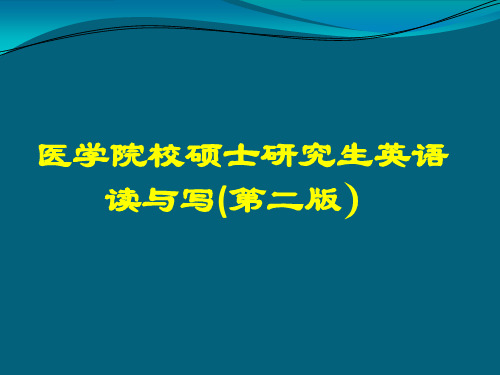
Background information
Background information
Harm versus benefit
The case for animal experiments is that they will produce great benefits for humanity, and that it is morally acceptable to harm a few animals.
医学院校硕士研究生英语 读与写(第二版)
English for Master Students in Medical Universities
Unit Seven
Text A Ethical Issues in the Use of Animals in
Biomedical Research
Outline
Background information Global analysis of the text Detailed study of the text Text structure analysis Reference answers to the exercises
BHale Waihona Puke ckground information
Background information
The three R’s
The three R’s are a set of principles that scientists are encouraged to follow in order to reduce the impact of research on animals.
Against animal experiments: Experimenting on animals is always unacceptable because: 1) it causes suffering to animals 2) the benefits to human beings are not always valid 3) any benefits to human beings that animal testing provides could be conducted in other ways
学术英语(医学)-Unit 7

Medical Abbreviations and Acronyms
Master the common medical abbreviations and acronyms used in medical settings. Avoid confusion and improve efficiency in communication.
Medical English for Medical Imaging and Radiography
Understand the language used in medical imaging and radiography. Learn how to effectively communicate findings and discuss imaging techniques.
Medical Case Reports and Presentations
Delve into the art of writing compelling medical case reports and delivering impactful presentations. Learn how to effectively communicate complex medical cases.
Medical English for Surgery and Anesthesiology
Explore the specialized vocabulary and terminology used in surgery and anesthesiology. Enhance your communication skills in the operating room.
学术英语(第二版)医学教师用书Unit 7
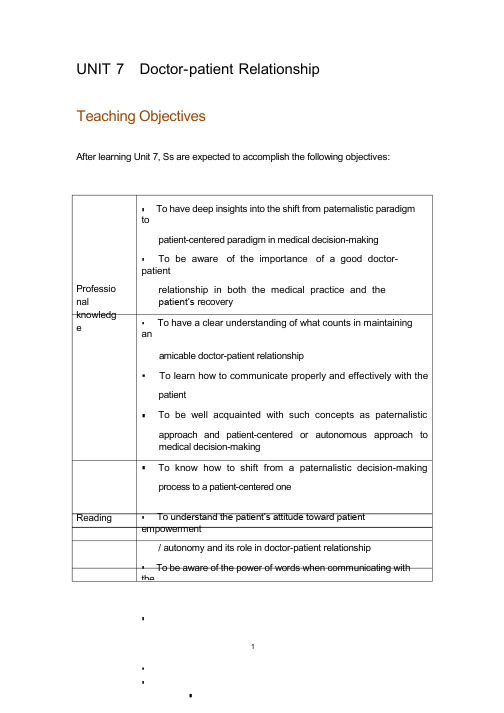
UNIT 7 Doctor-patient Relationship Teaching ObjectivesAfter learning Unit 7, Ss are expected to accomplish the following objectives:Professio nal knowledg eTo have deep insights into the shift from paternalistic paradigmtopatient-centered paradigm in medical decision-makingTo be aware of the importance of a good doctor-patientrelationship in both the medical practice and thepatient’s recoveryTo have a clear understanding of what counts in maintaininganamicable doctor-patient relationshipTo learn how to communicate properly and effectively with the patientTo be well acquainted with such concepts as paternalistic approach and patient-centered or autonomous approach to medical decision-makingTo know how to shift from a paternalistic decision-making process to a patient-centered oneReading To understand the patient’s attitude toward patientempowerment/ autonomy and its role in doctor-patient relationshipTo be aware of the power of words when communicating withtheTeaching Activities and ResourcesPart 1 ReadingText ALead-inSuggested teaching plan1. Doctor-patient relationship is among the most controversial focuses and mostwidely talked about in medical and healthcare communities. It is a determinant factor of quality care. On the part of language, words are sometimes value-laden and possess magic power. The same relationship can be differently connoted by using different terms. Before starting the class, it is advisable to know the implications of these terms: doctor, physician, medical practitioner, provider and patient, client, customer.Doctor: referring to a “teacher ” to show, to teach, or to appear right, and carryinga connotation of being seemly fitting and decentPhysician: denoting a practitioner of the art of healingMedical practitioner: a technique term without much connotationProvider: a generic term more or less related to businessPatient: indicating a suffering or sick person under medical treatmentClient: referring to a person who is willing to pay for goods or servicesCustomer: denoting one who buys goods or servicesAwareness of the subtleties as incurred by the use of the different terms to indicate the doctor-patient relationship will contribute to a better understanding of the characteristics of an amicable and ideal doctor-patient relationship.2. Lead Ss to do Task / Lead-in .1) Ask Ss to think of at least three different situations where doctors may beasked to make “tough decisions ” for their patient s.Decide whether life-support system should be continued or withdrawn.Decide whether euthanasia should be taken into consideration.Decide whether a new therapy should be tried.Decide whether surgery should be the first choice or the last resort.Decide whether transfer or referral is needed.2) Have a quick check and a short discussion on what Ss have come up with.3. Make a summary on the discussion and introduce the topic of Text A.Text ComprehensionSuggested teaching plan1. Launch the topic of the text as a continuum of Lead-in.2. Analyze the text and lead Ss to discuss, integrating Task 2 / Critical readingand thinking / Text A into analysis and discussion. The presentation topics should be assigned to individual Ss for preparation at least one week in advance.Ask other Ss to preview the text with the guidance of the presentation topics.3. Lead Ss to do Task 2 / Language building-up / Text A after a discussion of thetext.4. When analyzing the text, ask Ss to pay special attention to the sentences listed inLanguage focus below.5. If time allows, ask Ss to do Task 1 / Critical reading and thinking / Text A inabout five minutes. Check out the task by asking one or two Ss to read their answers. This is done to get an overview about the text.Language focus1. He was large and powerfully built…miraculously shrinking down to theireye level whenever he spoke with them. (P164, Para. 1)句子运用了对比的手法(large and powerfully built / shrink down to their eye level),有利于加强文章的艺术效果和感染力。
大学英语阅读教程-Unit7--how-to-be-a-scientist---全文翻译
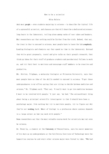
How to be a scientistG ina KolataA sk most people– even students majoring in science – to describe the typical life of a successful scientist, and chances are they will describe a dedicated existence: long hours in the laboratory, toiling alone among racks of test tubes and beakers.B ut researchers say that nothing could be further from the truth. I ndeed, they say, the irony is that to succeed in science, most people have to leave the lab completely. L eading biologists and chemists say they spend no time in the laboratory. I nstead they write grant proposals, travel and give talks on their group‟s research; they think up ideas for their staff of graduate students and postdoctoral fellows to work on, and try their best to motivate and encourage staff members to be creative and productive.D r. Shirley, Tilghman, a molecular biologist at Princeton University, says that most people have no idea of the skills needed to succeed in science. “I get these undergraduates in my office saying they are trying to decide between medicine and science,” Dr. Tilghman said. “They say, …I really want to go into medicine because I want to be involved with people.‟I just say, …my God.‟ The extraordinary thing about being a principal scientific investigator is that I should have been a psychology major. I do nothing but try to motivate people, try to figure out why they‟re not working hard. M ost of biology is a profession where success depends to a large extent on how you work with people.”S ome researchers say that the most valuable course work for scientists may not even be science.Dr. Ponzy Lu, a chemist at the University of Pennsylvania, says his worst memories of his days as an undergraduate at the California Institute of Technology were the humanities courses he and every other science major were forced to take. “We hadto write 500 to 1,000 words a week in essays,” Dr. Lu said. “I wasn‟t good at that kind of stuff.”But as soon as he become a successful scientist, Dr. Lu said he found that rather than puttering around the laboratory conducting experiments, he had to spend his time writing grant proposals, meeting deadlines. Dr. Lu said, writing “is about all I do.”A nd the dreaded essay writing at Cal Tech was “the most useful thing I learned.”S ome scientist s are delighted to leave the laboratory and find that they can finally shine when they are judged by their ideas and their administrative skills. Y et even people who feel this way are often loath to admit it, Dr. Lu said, because it is part of the mystique of science to say you love the lab. “It‟s like Jimmy Carter saying he lusted after women,” Dr. Lu said. “You can get in a lot of trouble saying things like that.”B ut no matter what they think of laboratory work, most researchers say that it was not until they were in graduate school, well on their way to becoming scientists, that they realized what the career path actually is.Dr. Kenneth Gross, a molecular geneticist at Roswell Park Cancer Institute in Buffalo, N.Y., remembers well his epiphany. I t happened when he was a graduate student at the Massachusetts Institute of Technology. O ne day, Dr. Gross was working happily in the lab next to a postdoctoral fellow, Dr. Arthur Skoultchi, who is now at Albert Einstein College of Medicine. F ull of enthusiasm, Dr. Gross said, he remarked that “the most incredible thing is that hey paid you to work in a lab.” Dr. Skoultchi, he said, replied, “Enjoy it while you can,”and explained to Dr. Gross what lay ahead. Y oung scientists move up the ladder from graduate student to postdoctoral fellow to assistant professor to, they hope, recipient of a federal grant. F rom then on, their time in the lab rapidly dwindles to nothing.Dr. Lu explained that it was not so surprising that most successful scientists ended up as thinkers rather than doers. “That‟s the whole problem with big science,” he said. “You have to have an army of people to do the work.”B ut, he added, “Part of what makes a person become a scientist is the desire for influence and power. A nd the only way you can have that is to have a group of people working on your ideas.”A typical research group at a leading university has about a dozen people, paid for mainly by grant money either from the federal government, private groups like the American Cancer Society or companies, that the principal investigator raises.D r. Lu said that although his salary is paid by the university, he must bring in $300,000 a year to run his lab. T his includes paying for equipment and paying the budding scientists who perform the experiments. Graduate students earn about $12,000 a year, some of which, is paid by fellowship; the rest comes from grant money. P ostdoctoral fellows receive about $20,000 a year.S ome scientist s run huge groups that have budgets equal to those of small corporations.D r. Jerome Groopman, an AIDS researcher at Brigham and Women‟s Hospital in Boston, said his group of about 50 people had an operating budget of $2 million a year.“It‟s clearly a major problem for a lot of people,”said Dr. Tom Maniatis, a molecular biologist at Harvard. “Nowhere in your education are you trained to be a manager or administer. S uddenly you are faced with writing grants and keeping track of spending. B ut the most difficult challenge is managing people. I don‟t think scientist s are prepared to do that at all.”From the new york times , april 4,1993.怎样成为一名科学家问大多数人- 即使在科学专业的学生- 来形容一个成功的科学家的典型生活,和机会,他们将在实验室中描述了一个专用的存在:时间长,独自之间的试管和烧杯架劳作。
【良心出品】unit7 the healing power of belief
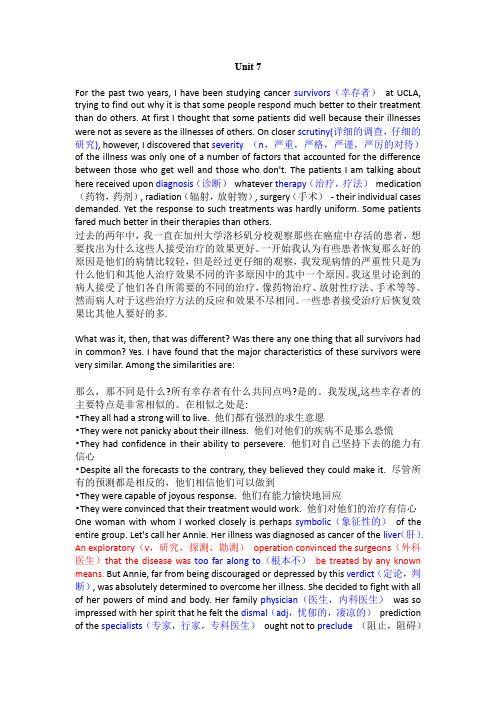
Unit 7For the past two years, I have been studying cancer survivors(幸存者)at UCLA, trying to find out why it is that some people respond much better to their treatment than do others. At first I thought that some patients did well because their illnesses were not as severe as the illnesses of others. On closer scrutiny(详细的调查,仔细的研究), however, I discovered that severity (n,严重,严格,严谨,严厉的对待)of the illness was only one of a number of factors that accounted for the difference between those who get well and those who don't. The patients I am talking about here received upon diagnosis(诊断)whatever therapy(治疗,疗法)medication (药物,药剂), radiation(辐射,放射物), surgery(手术)- their individual cases demanded. Yet the response to such treatments was hardly uniform. Some patients fared much better in their therapies than others.过去的两年中,我一直在加州大学洛杉矶分校观察那些在癌症中存活的患者,想要找出为什么这些人接受治疗的效果更好。
学术英语医学Unit7TextA翻译
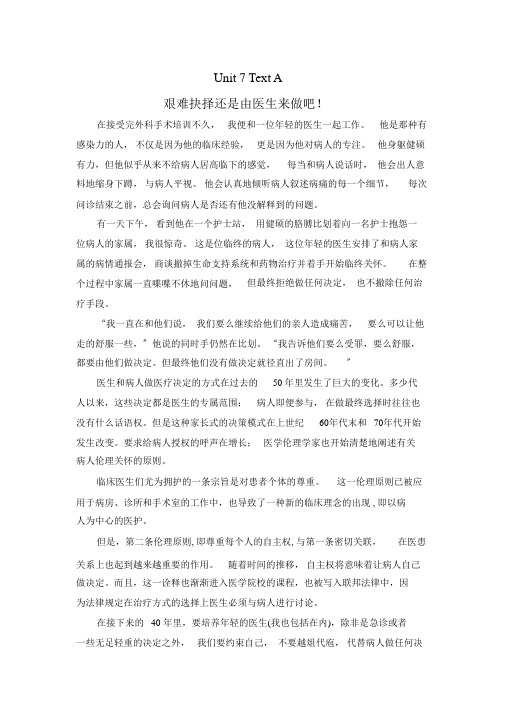
露泽的嘴唇微微眯起,眼睛的底部闪过一阵寒冷,整个力量爆发,也变成了浅青色的溪流。繁荣! ! !两条青色飘带在空中相撞。可怕的风刀向各个方向射击,地面上的草被分开,在地面上留下了纵横交错的痕迹。陆泽的左拳挡住 了蓝狼的爪子,骨头发出轻微的声音,刺痛来了,显然骨头已经破裂了。但是他并不在乎,右腿变成了长长的鞭子,体力,精神力量,蓝色剑刃向蓝狼的腰部急剧风化。蓝狼感受到了威胁,尾巴摇晃着,陆泽的右腿猛地撞在了一起,声音 一阵哗哗。陆泽的身体被震动了。就在陆泽准备再次冲上去的时候,他突然变黑了。好?这是黑暗的?陆泽怀疑地抬起头,但看到一个巨大的金色眼睑看着陆泽,然后他面前是黑色的,他的身体剧烈疼痛。当他的视线恢复时,它已经在外 面了。死亡人数增加一个..
有一天下午, 看到他在一个护士站, 用健硕的胳膊比划着向一名护士抱怨一 位病人的家属, 我很惊奇。 这是位临终的病人, 这位年轻的医生安排了和病人家 属的病情通报会, 商谈撤掉生命支持系统和药物治疗并着手开始临终关怀。 在整 个过程中家属一直喋喋不休地问问题, 但最终拒绝做任何决定, 也不撤除任何治 疗手段。
; 美高梅集团 https:// 美高梅集团;
; 美高梅平台 https:// 美高梅平台;
先发现有些人敢在她面前如此瘦。果然,下次我见面时,铁拳制裁的程度会增加一级。但是现在她忽略了吕泽的话并且说:“等我再重新添加,我是你的导师。此外,一个月后,精英班将接受入学测试,你准备好了,不要死。”泽点 点头,回过头来说:“哦,好吧,我会做好充分的准备..”他只说了一半,突然发现自己听到了一个坏词?他咳嗽哭了起来,确认道:“老师,你说死不对,你的意思是什么?” “吨吨.嗝〜字面意思。”陆泽:“..”听着南宫悄悄地倒 了一口酒,满意的呼吸,冷静地给出了解释,陆泽觉得他的心态已经爆发了。哪所学校的入学考试将会死亡?入门测试不应该比虚拟现实中的比赛更好吗?他抽搐了一下口:“好吧,老师不会惹麻烦,入学考试将会死亡。” “当然,我们 联邦大学和帝国理工学院的入学考试可能已经死亡,但你可以放心,死亡率仍然非常低。只有不到10%。”我吃了! !真的死了?陆泽震惊了!他的眉头微微皱起,有些有尊严的问道:“南宫先生,我们的入学考试是什么?”南宫静带着 一点酗酒说道:“啊?没事。只要走到前线。”几场战斗,攻击几个城市,这是联邦大学和皇家学院精英班的传统。
译文-Unit 7
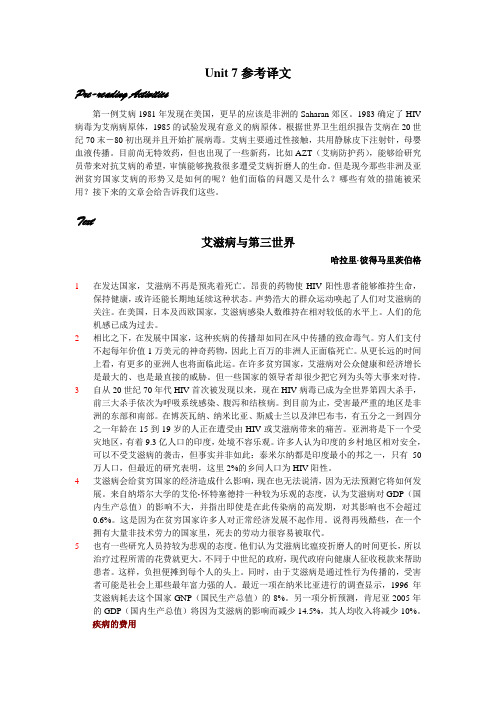
Unit 7参考译文Pre-reading Activities第一例艾病1981年发现在美国,更早的应该是非洲的Saharan郊区。
1983确定了HIV 病毒为艾病病原体,1985的试验发现有意义的病原体。
根据世界卫生组织报告艾病在20世纪70末-80初出现并且开始扩展病毒。
艾病主要通过性接触,共用静脉皮下注射针,母婴血液传播。
目前尚无特效药,但也出现了一些新药,比如AZT(艾病防护药),能够给研究员带来对抗艾病的希望,审慎能够挽救很多遭受艾病折磨人的生命。
但是现今那些非洲及亚洲贫穷国家艾病的形势又是如何的呢?他们面临的问题又是什么?哪些有效的措施被采用?接下来的文章会给告诉我们这些。
Text艾滋病与第三世界哈拉里·彼得马里茨伯格1在发达国家,艾滋病不再是预兆着死亡。
昂贵的药物使HIV阳性患者能够维持生命,保持健康,或许还能长期地延续这种状态。
声势浩大的群众运动唤起了人们对艾滋病的关注。
在美国,日本及西欧国家,艾滋病感染人数维持在相对较低的水平上。
人们的危机感已成为过去。
2相比之下,在发展中国家,这种疾病的传播却如同在风中传播的致命毒气。
穷人们支付不起每年价值1万美元的神奇药物,因此上百万的非洲人正面临死亡。
从更长远的时间上看,有更多的亚洲人也将面临此运。
在许多贫穷国家,艾滋病对公众健康和经济增长是最大的、也是最直接的威胁。
但一些国家的领导者却很少把它列为头等大事来对待。
3自从20世纪70年代HIV首次被发现以来,现在HIV病毒已成为全世界第四大杀手,前三大杀手依次为呼吸系统感染、腹泻和结核病。
到目前为止,受害最严重的地区是非洲的东部和南部。
在博茨瓦纳、纳米比亚、斯威士兰以及津巴布韦,有五分之一到四分之一年龄在15到19岁的人正在遭受由HIV或艾滋病带来的痛苦。
亚洲将是下一个受灾地区,有着9.3亿人口的印度,处境不容乐观。
许多人认为印度的乡村地区相对安全,可以不受艾滋病的袭击,但事实并非如此:泰米尔纳都是印度最小的邦之一,只有50万人口,但最近的研究表明,这里2%的乡间人口为HIV阳性。
高中英语第二册上Unit 7 Living with disease--篇章分析
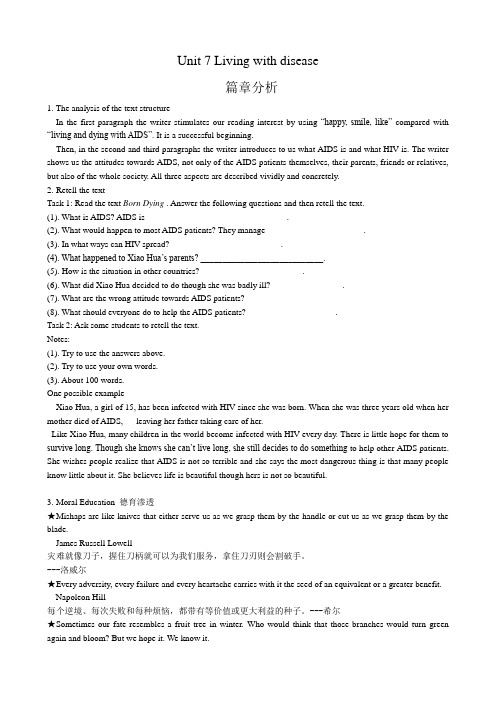
Unit 7 Living with disease篇章分析1. The analysis of the text structureIn the first paragraph the writer stimulates our reading interest by using “happy, smile, like” compared with “living and dying with AIDS”. It is a successful beginning.Then, in the second and third paragraphs the writer introduces to us what AIDS is and what HIV is. The writer shows us the attitudes towards AIDS, not only of the AIDS patients themselves, their parents, friends or relatives, but also of the whole society. All three aspects are described vividly and concretely.2. Retell the textTask 1: Read the text Born Dying . Answer the following questions and then retell the text.(1). What is AIDS? AIDS is ________________________________.(2). What would happen to most AIDS patients? They manage ______________________.(3). In what ways can HIV spread? _________________________.(4). What happened to Xiao Hua’s parents? ____________________________.(5). How is the situation in other countries? _______________________.(6). What did Xiao Hua decided to do though she was badly ill? ________________.(7). What are the wrong attitude towards AIDS patients?___________________(8). What should everyone do to help the AIDS patients? ____________________.Task 2: Ask some students to retell the text.Notes:(1). Try to use the answers above.(2). Try to use your own words.(3). About 100 words.One possible exampleXiao Hua, a girl of 15, has been infected with HIV since she was born. When she was three years old when her mother died of AIDS, leaving her father taking care of her.Like Xiao Hua, many children in the world become infected with HIV every day. There is little hope for them to survive long. Though she knows she can’t live long, she still decides to do something to help other AIDS patients. She wishes people realize that AIDS is not so terrible and she says the most dangerous thing is that many people know little about it. She believes life is beautiful though hers is not so beautiful.3. Moral Education 德育渗透★Mishaps are like knives that either serve us as we grasp them by the handle or cut us as we grasp them by the blade.---James Russell Lowell灾难就像刀子,握住刀柄就可以为我们服务,拿住刀刃则会割破手。
学术英语(医学)_Unit_7

Unit 7 Life and Medicine
Text A Critical reading and thinking
Topics for presentation
3 In what way can patient empowerment be good for the patient?
Two principles /tenets / notions involved in the decision-making process • respect for the person
Unit 7 Life and Medicine
Lead-in
Task: Read the title of Text A and imagine three different situations in which doctors may be asked to make “tough decisions” for their patients. Then write them down.
Useful expressions
• …a majority of patients are being left to make decisions that they never wanted to in the first place.
• When it came to medical decisions, almost all the respondents wanted their doctors to offer choices and consider their opinions.
• Suggested answers
Unit 7 Life and Medicine
医学英语综合教程第七单元
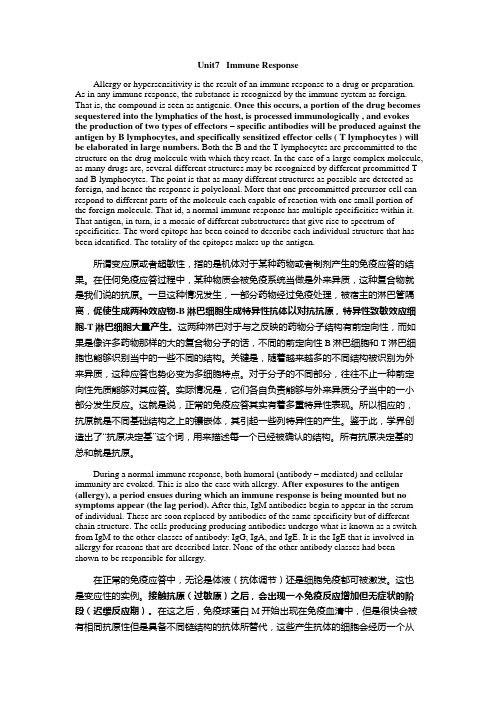
Unit7 Immune ResponseAllergy or hypersensitivity is the result of an immune response to a drug or preparation. As in any immune response, the substance is recognized by the immune system as foreign. That is, the compound is seen as antigenic. Once this occurs, a portion of the drug becomes sequestered into the lymphatics of the host, is processed immunologically , and evokes the production of two types of effectors – specific antibodies will be produced against the antigen by B lymphocytes, and specifically sensitized effector cells ( T lymphocytes ) will be elaborated in large numbers. Both the B and the T lymphocytes are precommitted to the structure on the drug molecule with which they react. In the case of a large complex molecule, as many drugs are, several different structures may be recognized by different prcommitted T and B lymphocytes. The point is that as many different structures as possible are detected as foreign, and hence the response is polyclonal. More that one precommitted precursor cell can respond to different parts of the molecule each capable of reaction with one small portion of the foreign molecule. That id, a normal immune response has multiple specificities within it. That antigen, in turn, is a mosaic of different substructures that give rise to spectrum of specificities. The word epitope has been coined to describe each individual structure that has been identified. The totality of the epitopes makes up the antigen.所谓变应原或者超敏性,指的是机体对于某种药物或者制剂产生的免疫应答的结果。
医学英语综合教程第二版Unit7
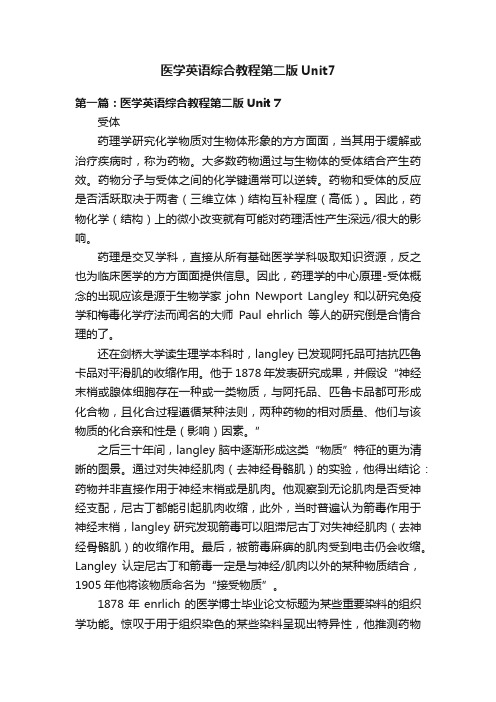
医学英语综合教程第二版Unit7第一篇:医学英语综合教程第二版Unit 7受体药理学研究化学物质对生物体形象的方方面面,当其用于缓解或治疗疾病时,称为药物。
大多数药物通过与生物体的受体结合产生药效。
药物分子与受体之间的化学键通常可以逆转。
药物和受体的反应是否活跃取决于两者(三维立体)结构互补程度(高低)。
因此,药物化学(结构)上的微小改变就有可能对药理活性产生深远/很大的影响。
药理是交叉学科,直接从所有基础医学学科吸取知识资源,反之也为临床医学的方方面面提供信息。
因此,药理学的中心原理-受体概念的出现应该是源于生物学家john Newport Langley和以研究免疫学和梅毒化学疗法而闻名的大师Paul ehrlich等人的研究倒是合情合理的了。
还在剑桥大学读生理学本科时,langley已发现阿托品可拮抗匹鲁卡品对平滑肌的收缩作用。
他于1878年发表研究成果,并假设“神经末梢或腺体细胞存在一种或一类物质,与阿托品、匹鲁卡品都可形成化合物,且化合过程遵循某种法则,两种药物的相对质量、他们与该物质的化合亲和性是(影响)因素。
”之后三十年间,langley脑中逐渐形成这类“物质”特征的更为清晰的图景。
通过对失神经肌肉(去神经骨骼肌)的实验,他得出结论:药物并非直接作用于神经末梢或是肌肉。
他观察到无论肌肉是否受神经支配,尼古丁都能引起肌肉收缩,此外,当时普遍认为箭毒作用于神经末梢,langley研究发现箭毒可以阻滞尼古丁对失神经肌肉(去神经骨骼肌)的收缩作用。
最后,被箭毒麻痹的肌肉受到电击仍会收缩。
Langley认定尼古丁和箭毒一定是与神经/肌肉以外的某种物质结合,1905年他将该物质命名为“接受物质”。
1878年enrlich的医学博士毕业论文标题为某些重要染料的组织学功能。
惊叹于用于组织染色的某些染料呈现出特异性,他推测药物是否产生治疗效果取决于它是否具有“合适的亲和性”。
然而,他将这个想法最先应用于免疫学而非药理学。
医护英语 Unit 7课件
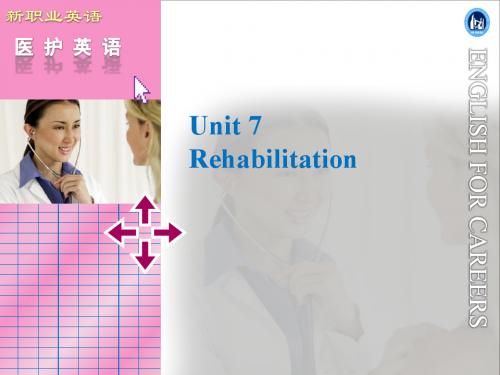
< Back
Next >
Home
Unit 7 Rehabilitation
Hale Waihona Puke Reading ATask 1 Before reading the passage, see how much you know about rehabilitation by answering the following questions.
< Back
Unit 7 Rehabilitation
Reading A
物理疗法 物理治疗服务由在医院、康复诊所、医疗诊室、疗养院和运动健身中 心工作的物理治疗师提供。 物理治疗的主要目标是恢复身体机能。这包括处理疼痛、改善关节活 动度、肌力、身体姿势、平衡能力、耐力、控制力和感觉(知觉)。根据 病症的种类,针对每个人必须确定具体的目标。一些典型的目标可包括改 善关节活动度、增强肌肉力量和增加步行距离。例如,创伤性脑损伤患者 应接受物理疗法。 职业疗法 职业治疗服务由职业治疗师提供。职业治疗的目标是通过有限的帮助 或使用仪器,使患者能独立进行各种活动。 例如, 一位由于中风而丧失正 常机能的患者或者一位不能进行日常生活活动的老年人可能需要职业治疗。 通过职业治疗, 患者可能会达到不用帮助的程度。
新职业英语
Unit 7 Rehabilitation
Unit 7 Rehabilitation
1
Warming-up Reading A Listening Speaking
5
Reading B Writing Project Vocabulary and Structure
2 3 4
6
7 8
< Back
Translation
医学主题英语-阅读探索及语言应用-课后单词

Unit One1.the entire previous history of humankind (人类)2.due principally (chiefly) to3.to rescue (save) civilization from4.the dread (fearful) shadow of diseases5.the conscience (觉悟) and concern of scientists6.driving forces (动力)7.to advance (promote) health8.the amplification (增大) of virus9.tissue culture (培养)10.killed and live attenuated (减弱 ) vaccines11.national immunization (免疫) days12.monitoring (监测) methods13.worldwide eradication (elimination) of polio14.little reason for complacency (自满)15.microbial (微生物) enemies16.temporary (暂时) victories17.be adept (skillful) at developing new defenses18.to facilitate (使便利) the spread of epidemics19.political and economic mismanagement (管理不善)20.the deprivation (poverty) of population21.to address (deal with) the largest disease burden22.major scourge (灾祸) such as malaria and AIDS23.in an interdisciplinary (跨学科的) way24.talented (有才能的) young scientists25.to underwrite (support) their mission26.stunning pace (speed, rate) of change27.potential, passion, and perception (洞察力) ofscientists28.need to be tapped (explored) 29.to address (attend to) global health needs30.to make deliberate (慎重的) use of it31.to bear (keep) in mind that32.strategically (战略上) placed on33.the scientific underpinning (基础) of policy34.evidence-based (循证) policy35.policy setting (establishment)36.to bear on (影响) the well-being of people37.a(n) terminally ill patient (临终病人)38.metastatic (转移) renal cancer39.our beloved (热爱的) profession40.our zeal (enthusiasm) for medical science41.bedside (clinical) care42.to conduct groundbreaking (突破的) research43.a(n) noble (崇高的) calling44.a(n) oral formulation (口服制剂) of morphine45.bone metastasis (转移)46.radicular (根的) pain47.spinal (脊柱) root48.to counsel (忠告) the terminally ill patient49.to reflect upon (反省) my profession50.caring and compassionate (有同情心的)51.chemotherapeutic (化疗的) agents52.to shower their patients with genuine (true) love andcompassion53.emotional and physical (身体的) support54.dignity (尊严) and compassionbination (cooperation) of physicians and nurses56.to attend to (address, meet, satisfy) the physicalneeds of sick57.the bureaucrats (官僚) and administrators58.the inflated price tag (物价上涨)59.precious (very, extremely) few60.the threat of litigation (诉讼)61.an ethical, legal, and economic consensus(agreement)62.to allocate (分配) these resources63.to pass health care legislation (立法)64.assembly-line mentality (理念)65.unethical in the extreme (极度,非常)66.the application of scientific inquiry (investigation)67.to die naturally and humanely (人道地)68.inauguration (就职) speech69.to garner (acquire, obtain) more support70.to venture (go) beyond71.the walls of the ivory tower (象牙塔)72. a more entrenched (deeply rooted) obstacle73.lip service (口惠)74.a(n) innovative (革新的) program75. a growing nucleus (核心) of76.between academia (学术界) and industry77.the messy fray (争论) of democracy78.the scientific community (科技界)79.a(n) chaotic (混乱的) realm80.a(n) enlightened (文明的) citizenry81.politicians and lobbyists (说客)Unit Two1.the acquisition (获得) of knowledge2.a(n) prized (珍贵的) commodity3.the role of breadwinner (家庭支柱)4.the family boarding (供膳宿的) house5.(勤劳地) industriously generated profits6.Dad’s consistent (一贯的) message7.extracurricular (课外的) activities8.a(n) avid (渴求的) reader9.glowing approbation (称赞)10.distinctly different flavors (韵味)11.a(n) academic (教学的) physician12.to delight in (热衷于) learning13.to need a(n) reminder (提示)14.collegial teasing (逗乐)15.at the crack of dawn (黎明)16.to smile graciously (和蔼地)17.in a very heavy accent (口音)18.nostalgic (怀旧的) reminiscence19.the privilege (特权) of learning20.reverence (respect) for knowledge21. a frustrating and inefficient (低效率的) process22.to assemble (收集) paper charts23.to become intimately (深深地) aware of24. a young, enthusiastic, idealistic (理想主义的)person25.a(n) compassionate (有同情心的) clinician26.to employ that knowledge reliably (可靠地)27.to immerse (沉浸) myself in the hospital28.jam-packed (crowded) emergency departments29.primary (初级的) prevention30.extraordinary (极度的) waste31.to remedy (correct) these problems32.insightful (有见识的) teachers and colleagues33.miraculous (奇迹般的) tools34.to orchestrate (coordinate) conversation andcooperation35.interdisciplinary (交叉学科的) teamwork36.the medical establishment (system)37.untapped (未汲取的) resource38.to channel (引导) the energy into39.exuberant (精力旺盛的) practitioners40.disparities (差异) of quality41.health care settings (环境)42.introductory (入门的) science course43.the distinguished (杰出的) committee of scientists44.natural phenomena (现象)45.active inquiry (exploration)46.quality assessments (评估)47.to explicitly (明确地) measure48.to energetically (积极地) advertise and explain49.accelerate (加快) the redefinition of scienceeducation50.to need urgently (急迫地)Unit Three1.a(n) general (普外) surgeon2.specialty (专科) surgeons3.a(n) plastic (整形) surgeon4. a hospital administrator (行政人员)5.to review a(n) untimely(过早的) death6.to reprimand (训斥) a disgraced colleague7.medical consultation (会诊)8.the melding (combining) of music and medicine9.a(n) gifted (有天赋的) musician 10.to bestowed (赐予) the gift of prophecy11.the camaraderie (同志情谊) of making musictogether12. a time capsule (时光锦囊)13.a(n) theme (主题) party14.in the seasonality (季节性) of medical practice15.the cruelest hoax (戏弄)16.blossoms (生气盎然) of rebirth17.child abuse (儿童虐待)18.to become prevalent (盛行的)19.domestic violence (家庭暴力)20.psychiatric (精神病的) symptoms21.to share similar concerns (忧虑)22.to approach (treat) music as therapy23.entertainment (娱乐) value24.to remove one’s inner (内心)restlessness25.to quiet the agitation (anxiety) of ceaseless thinking26.the reduction of psychophysiologic (心理生理的)stress27.on a(n) therapeutic (治疗的) level28.the harried (被烦扰的) left hemisphere29.the limbic system (大脑边缘系统)30.pitch and rhythm (节奏)31.to have alternative (可选择的) plans32.bodily (physical) health33.enrichment (充实) of the spirit34.nostalgic (怀旧的) foray into the music of the 1940s35.to add balance to one’s existence (生存)36.the harmonies (和声) and rhythms37.statistically (统计上) significant38.anniversary (周年纪念日) dinner candles39.the diagnoses that reek (散发出) frustration40.the rule out (exclude) fibromyalgia41. a free-flowing account (叙述) of her symptoms42.to resort to (诉诸) the last refuge43.the harried (被烦扰的)physician44.the wind-driven sleet (雨夹雪)45.the capricious (变化莫测的) nature of the events46.the conspiracy (阴谋) of machinery47.near the edge (边缘) of tolerance48.to restore equanimity (镇定,平静)49. a service profession (occupation)50.poorly articulated (expressed)51.to succumb to (die of) melanoma52.bone metastases (转移)53.to ease (relieve) the loneliness, fear, and emotionalsuffering54.to have unrealistic (不切实际的) expectations55.a(n) attentive (专心的), understanding ear56.the currency of the realm (领域里的流行)57.the medical interview (问诊)58.to notice my heart pounding (beating)59.the feel of sweat on one’s forehead (前额)60.a(n) triage (病人鉴别分类) sheet61.grumbling (饥肠辘辘的)stomach62.racism and hatred (仇恨)63.aches (疼痛) and pains64.billing sheets (账单)65.primary physician (初级保健医生)66.to access (use) the computer 67.periodic (定期的) checks68.to shrug one’s shoulders (耸肩)Unit Four1.with the advent of (随着……的到来)2.become laden with (full of)3.corporate (公司) management4.to articulate (voice) age-old frustrations5.forward-thinking and laudable (值得称赞的)concepts6.preventive interventions (介入)7.reparative (治疗的) interventions8.those in pinstripes (商人)9.conceptual (观念的) constructs10.ostensibly (obviously) because11.allied (同行的) health professionals12.routine (常规的) medical care13.to carry a(n) connotation (含义) of14.integral (组成部分的) components15.to give the advantage of (有利于)16.to diluting (稀释) identification17.the recipient (接受者) of medical care18.to endure (忍受) pain calmly19.the vernacular (jargon) of managed care20.more literally (确切地)21.to provide an impetus (动力) for22.of a(n) Faustian (浮士德式的) nature23.society in general (整个社会)24.to serve a(n) nominative (称谓的) function25.too obtuse (迟钝的) to declare openly26.as accurately (精确地) as possible27.the jargon (vernacular) of managed care28.in the final analysis (总之)29.to make a(n) career of (以……为事业)30.to acquiesce (默许) the shifting currents31.the timbre (基调) of the debate32.to stretch (extend) myself toward the model33.seemly, fitting, and decent (正派的)34.to increase consistency (一致性) of record keeping35.to decrease the cost of transcription (抄写)36.on a(n) whim (一时的兴致)37.to leaf through (翻阅) records38.the terse (concise) language39.between tidy and almost illegible (难以辨认的)40.a(n) reproducible (可复制的) and less personalformat41.to stir (使激动) and touch me42.peripheral neuropathy (神经病)43. a mind jumbled and bruised (被挫伤)44.with my own slant (观点) on things45.to scratch one’s head (感到困惑)46.to decipher (decode) what I really meant47.loopy (潦草的) handwriting48.hospice (临终关怀) volunteer49.to make eye contact (眼神交流)50.behavioral (行为的) disturbance51.have the right to privacy (隐私)52.depressive disorder (忧郁症)53.a(n) concrete (具体存在的) plan54.to voice (articulate) grievances55.without discrimination of reprisal (报复) 56.the newspaper obituary (讣告)57.outrageous (不寻常的) acts58.everyday rebellious (反抗)Unit Five1.annual (yearly) meeting2.especially timely (in time)3.harsh (严厉的) penalty4.scientific illiteracy (ignorance)5.unprecedented (前所未有的) financial and policysupport6.the general citizenry (公民)7.to hold scientists in high regard (respect)8.the integrity (honesty) and credibility of science9.a(n) spate of (大量) recent incidents10.research accomplishments (研究成果)11.the implications (影响和结果) of scientificdiscoveries12.substantial (巨大的) tension13.religious (宗教的) beliefs14.embryonic (胚胎的) stem cells15.scientific advances (进展)16. a high priority (当务之急,头等大事)17.a(n) genuine (真诚的) dialogue18.inappropriate (improper) behavior19.out of proportion (不成比例) to20.widely publicized examples (广泛报道的事例)21.scientific misconduct (不端行为)22.accusations (指责) of misconduct23.to tarnish (玷污,败坏) the image24.to diminish (降低) the credibility ofEdit by Jason Tang25.the entire scientific enterprise (事业)26.undisclosed (未披露的) conflicts of interest27.to overinterpret (夸大其词) scientific facts28.scientific behavioral norms (规范) and standards29.allegorically (比喻地) speaking30.to listen for clues (evidences) of disease31.to look for signs of pathology (病理)32.bloodshot (充血的) eyes33.to no avail (无济于事)34.blunt chest trauma (创伤)35.mutual partings of the way (分道扬镳)36.declared (公然的) and naked hate37.medicolegal (医学法律的) liabilities38.in imminent (immediate) danger39.in the ideal and neutral configuration (处境)40.to update (更新) him on his condition41.to order serial radiographs (系列X光照相检查)42.to obtain daily arterial (动脉的) blood gases43.to follow hematocrits (血细胞比容)44. a broken, ailing (病态的), and sorry soul45.surgical intervention (介入)46.shell of prejudice (偏见,歧视)47.intellectual (理智的) isolation48.to accept consolation (安慰)49.legend has it (据传说)50.a(n) inscription (铭文) bearing the words51.to uncover (reveal) truths52.odd scraps (零碎) of evidence53.the paucity (lack) of data54.gender (sex) roles 55.the combustibility (易怒性) of the interface56.to steer clear of (avoid)57.under the unifying framework (框架)58.human behavioral ecology (生态学)59.to pursue (explore) similar questions60.the ethnographic (人种学的) data61.outdated (obsolete, out-of-date) versions62.mathematical (数学的) analyses63.to foster (nurture) dialogue between64.highly interconnected (互相连接的) cities65.diverse (distinct, different) areas of research66.to deliver (传递) an optimistic messageUnit Six1.successive (相继的) generations2.functionality and versatility (多用途)3.added (附加的) functionality4.moral (道德的) standards5.ethical (伦理的) principles6.behavioral (行为的) guidelines7. a long and arduous (艰巨的) evolutionary process8.social discord (不和谐)9.to make improvement (改进)10.remote ancestors (祖先)11.the evolutionary (进化的) tree12.solitary (独居的) predators13.a(n) extended family (大家庭)14.wandering (居无定所的) bands15.a(n) embryonic (萌芽期的) Golden Rule16.the physical environment (物质环境)17.parental supervision (监护)Edit by Jason Tang18.the practice of monogamy (一夫一妻制)19.verbal symbols (语言符号)20.ancestral primates (灵长类)21.Homo sapiens (智人)22.archaic (古代的) humans23.in extreme (极端的) cases24.think in abstractions (抽象)25.in critically (vitally) important ways26.to populate (定居) the habitable world27.formed confederations (同盟) of tribes28.to multiply explosively (剧增地)29.on a(n) grander (large) scale30.trade and commerce (商业)31.cultural markers (标识)32.conventions (社会习俗) in dress and manners33.the basic template (model)34.kingdoms and empires (帝国)35.the time frames (时段)36.at the dawn (拂晓) of a new millennium37.galloping (飞速的) technological change38.to facilitate (promote) cooperation39.fully explored an defined (被定义)40.our archive (档案) of past experience41.fore-thinking (超前意识的) imagination42. a date with immortality (流芳百世)43.natural riches (resources)mon kinship (亲属关系)45.to have a social dimension (aspect)46.noble ambitions (抱负)47.a(n) fiercely (激烈地) competitive world 48.impartial (无偏见的) consideration49.pretexts and apologias (辩解)50.the scientific enterprise (事业)51.to pay particular heed (attention) to52.social implications (consequences)53.the scientific endeavor (effort)54.trust in authority (权威)55.mores and prejudices (偏见)56.objective and reliable (可靠的)57.a(n) stern (strict) restraintmunal (collective) will59.fertility (受孕) clinics60.to create quite a stir (轰动)61.a(n) affront (冒犯) to human dignity62.those on the fringes (极端分子)63.with credentials and track records (业绩)64.to pioneer the use of (首先使用)65.reproductive (生殖的) biology66.surrogate (代孕) mums67.adoption (领养) agencies68.a(n) jolt (刺激) of electricity69.a(n) staggering (惊人的) 97 per cent70.a(n) reckless (鲁莽的) waste of time and energy71.miscarriages or abortions (堕胎)72.sickly of deformed (畸形的)73.the sole (only) survivor74.wrong instincts (直觉)Unit Seven1.the scientific triumphs (accomplishment)2.the past millennium (千年)Edit by Jason Tang3.to honor (敬重) the origins of science4.to give grateful (感激的) thanks to5.a(n) magical (神秘的) view6.in concrete (具体的) terms7.rational (理性的) argument8. a natural mode (pattern) of thought9.to be beautifully illustrated (举例说明)10.to have the honor (荣幸) of11.the opposite angles (对角)12.the centre of gravity (重心)13.to arrive at (reach) a proof14.an elegant rebuttal (反驳)15.applied (应用) mathematician16.vigorous (激烈的) debate and discussion of evidence17.the admiration (赞赏) of one’s peers18.to challenge authority (权威)19.to point out forcibly (强烈地)20.debt and credit (借贷)21.political disputes (争论)22.social castes (等级)23.national boundaries (国界)24.philosophical distinctions (辨别)25.in the philosophy biz (圈子)26. a dichotomy or a(n) continuum (连续体)27.mental constructs (构想)28.highly abstract (抽象的) things29.to spill much ink over (花费大量笔墨)30.autonomous (独立自主的) individuals31.dress codes (规范)32.at one’s core (核心) 33.the interaction of individuals (个人)34.primary (基本的) sensations35.the end of the scale (标度终点)36. a highly vociferous (激烈的) debate37.in circles of philosophy (在哲学圈里)38.be wet blankets (令人扫兴的人) at parties39.abstruse (深奥的) conditions40.chemical composition (成分)41.at the cutting edge (前沿) of science42.genetically modified (转基因的) crops43.to make headlines (成为报纸的头条新闻)44.the influential (有影响的) climate researcher45.to strike a balance (达到平衡)46.the justifiability (合理性) of animal experiments47.celebrity endorsement (support)48.to make assertions (claims)49.eminent (著名的) researchers50.to sign a(n) declaration (宣言)51.an impressive rejoinder (rebuttal)52.to trace (追溯) the origins of53.to engender (produce) trust54.the imprimatur (recognition) of the scientificacademy55.in the refereed (审阅的) literature56.lobby groups (游说集团)57.to place a clear obligation (responsibility) on58.to substantiate (prove) it with evidence59.in all probability (很可能地)60.intellectual authority (权威)61.to provide invaluable weight (重量) of evidenceEdit by Jason Tang62.the reliable (可信的) outcome63.toxicity (毒性) testing64.to toss a coin (掷硬币决定)65.authority figures (权威人士)66.scientific credibility (可信性)67.expensive and time-consuming (耗时的)68.intellectual integrity (honesty)Unit Eight1.the theory of relatively (相对论)2.thinking strategies (策略)3.to illuminate (阐明) nothing4.the piles of data (成堆的数据)5.run-of-the-mill (ordinary) physicists6.extraordinary (非凡的) genius7.a(n) extraordinarily (异常地) high IQ8.considerable debate (argument)9.average (平均的,普通的) intelligence10.to fixate on (注意力集中于) something11.the most promising (likely) approach12.to be arrogantly (傲慢地) certain of13.to find a needle in a haystack (大海捞针)14.to be encountered (遇上) a problem15.to be skewed (偏离) by the prism of past experience16.to foster rigidity (僵化) of thought17.superficially (浅薄地) similar18.to lead the thinker astray (误入歧途)19. a gene pool (基因库)20.genetically encoded (编码的) wisdom21. a rich repertoire (collection) of ideas and concepts22.to survive and prosper (蓬勃发展) 23.to become stagnant (停滞的)24.the most distinguished (卓越的) experts25.to be conditioned (制约的) to think26.a(n) expert (专家) taxonomist27.the textbook case (典型例子)28.analogous (可比拟的) to biological evolution29. a rich diversity of alternatives and conjectures (假设)30.a(n) departure (背离) from reproductive knowledge31.a(n) prodigious (immense) variety of novel andoriginal ideas32.a(n) thumbnail (简略的) description33.to be biased (有偏见的) toward his usual way ofseeing things34.the essence (实质) of the problem35.to abandon (抛弃) the initial approach36.a(n) environment-friendly (环保的) fuel37.to make his thought graphically (通过图表) visible38.visual and spatial (空间的) abilities39.immense (huge) productivity40.the laws of heredity (遗传)41.to make juxtapositions (并置)42.to tolerate ambivalence (矛盾心理) betweenopposites43.two incompatible (不兼容的) things44.to perceive resemblance (similarities)45.to draw a(n) analogy (类比)46.to render an overwhelming verdict (裁定)47. a cultural icon (偶像)48. a rather fuzzy (模糊的) understandingEdit by Jason Tang49.the vastness (浩瀚) of the universe50.previously held unquestionable (无懈可击的)51.to cast (投) doubt on52.the reliability (可靠性) of the investigators’conclusions53.the origin (起源) of genius54.to yearn for (desire) genius55.the intermingling (mix) of culture, history, and lifeexperience56. a history dating back to (追溯到) Plato57.to think the reverse (相反)58.to govern (control) all organic life59.an interacting hierarchy (order) of feedback systemsmunities and ecosystems (生态系)61.intellectual intuition (直觉)62.to face strong opposition (反对)63.a(n) doctrinal (dogmatic) viewsUnit Nine1.of ultimately lawful materialism (唯物论)2.as concisely (简明地) as possibleanizes systematic enterprise (事业)4.to condense (压缩) the knowledge5.testable laws and principles (原理)6.diagnostic (特征的) features7.confirmed or discarded (rejected)8.to abstract (抽象化) the information9.aesthetically (审美地) most pleasing10.universally (普遍地) accepted scales11.rendered unambiguous (明确的)12.proved consistent (一致) with one another 13.ineradicable (根深蒂固的) technical base14.to satisfy (meet) personal psychological needs15.to consume (take) large amounts of time16.to yield (produce) negative or ambiguous results17.administrative (行政的) duties18.original (原创性的) research19.no holds barred (无清规戒律约束)20.the frontier (前沿) of science21.a(n) abstracted (抽象化的) world22.the mother lode (矿脉)23.to practice elitism (精英主义) without shame24.to set foot on virgin soil (处女地)25.interpretation (阐释) and explanation26. a scattering of icons (偶像)27. a great deal of bickering (口角,争端)28. a loose confederation (联邦)29.petty fiefdoms (封地)30.to hope for a strike (意外成功)31.the least conspiratorial (搞阴谋的) of professions32.the population at large (大众)33.from generous to predatory (贪婪的)34.(from) well-adjusted to psychopathic (精神变态的)35.(from) causal (散漫的) to driven36.(from) gregarious to reclusive (隐居的)37.clinically certifiable (可证明)38.from venal (贪污腐败的) to noble39.in the temple (殿堂) of science40.to achieve utilitarian (功利的) ends41.convincingly validated (verified/proved)42.to steer (驾驶,航行) for blue water医学主题英语——阅读探索及语言应用课后词组Edit by Jason Tang43.to suffer boredom (单调)44.under varying (changing) circumstances45.statistical (统计的) analyses46.to reject null (无价值的) hypotheses47.a(n) reputable (声誉好的) peer-reviewed journal48.to be indissolubly (坚不可摧地) united49.a(n) whiz-kid (outstanding) professor50.a(n) obscure (无名气的) journal51.to stiffen a slightly floppy (weak) argument52.class or creed (宗教信仰)anized skepticism (怀疑态度)54.social conventions (习俗)55.mundane (世俗的) practice56.publish or perish (死亡)57.to cite generously and meticulously (一丝不苟地)58.to fudge (捏造) data59.to vilify (贬低) out opponents60.personal credibility (可信性)61.driven, shaped and honed (被磨练)62.to humbly (谦虚地) accept realities63.social imperatives (obligations)petitive ambition (desire)65.a(n) obsolete (out of date) ethos66.to maximize (最大化) pleasure67.to minimize (最小化) pain68.to laud (称赞) a desirable personal characteristic69.to avoid complacency (自满)70.to be wired (conditioned) to respond positively11。
Unit7 Living with disease reading 人教版
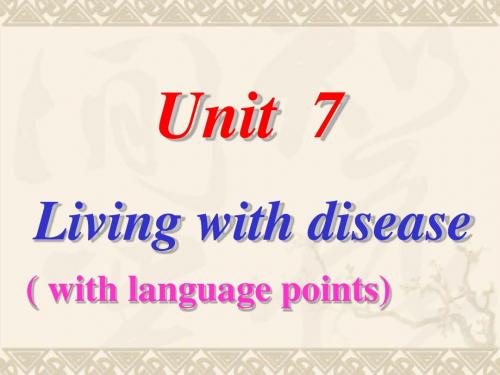
She persuaded him for a cup of coffee.
*persuade的准确含义是“说服”, 表示“说而 不服”不能用persuade, 而用try to persuade
I tried to persuade him to give up smoking, but he refused.
Unit 7
Living with disease
( with language points)
1 What kind of deadly diseases do you know? AIDS, cancer, SARS, heart attack and so on. 2 What attitudes do you think we should take towards these diseases?
Giving an AIDS patient a hug.
How do you think you would react if you were XiaoHua?
Period 1
1.deadly (adj.)极其危险的,致命的,非常的; 像死了似的, 死气沉沉的 Cancer is a deadly disease. A deadly silence filled the class. Her deadly appearance was due to long illness.
having existence only in the imagination
1 What kind of person is Xiao Hua?
She is a 12-year-old teenager who has AIDS.
临床医学英语Unit7
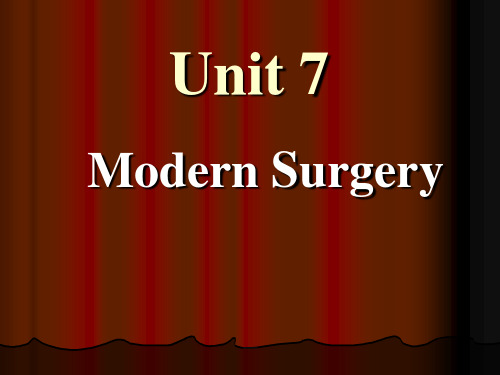
MAS (ie, laparoscopy) has been used by gynecologists for more than 5 decades. Its application to general surgery began when the first laparoscopic cholecystectomy was performed in 1985. In 1987, the laparoscopic cholecystectomy was popularized, and laparoscopic cholecystectomy soon became the standard of care. Since that time, MAS has been applied to numerous other procedures with good results.
melan/o ( black ) e.g. melanoma sympath/o ( sympathetic ) rect/o (rectus) -pexy ( to fix ) 固定, 固定术 e.g. rectopexy metastasis /metastases/metastatic/metastasize
Equipment Special medical equipment may be used, such as fiber optic cables, miniature video cameras and special surgical instruments handled via tubes inserted into the body through small openings in its surface. The images of the interior of the body are transmitted to an external video monitor and the surgeon has the possibility of making a diagnosis, visually identifying internal features and acting surgically on them.
医学英语新教程-习题参考答案Unit7

医学英语新教程-习题参考答案Unit7Unit SevenThe Respiratory SystemSection A1—c 2—g 3—h 4—b 5—i6—a 7—f 8—e 9—j 10—dSection BPassage 11.What’s the definition of bronchiectasis?Bronchiectasis is defined by the presence of permanent and abnormal dilation of the bronchi.This usually occurs in the context of chronic airway infection causing inflammation.2.What are the three main phenotypes of bronchiectasis categorized by Reid?Reid categorized bronchiectasis as having three main phenotypes: (1) tubular characterized by smooth dilation of the bronchi; (2) varicose in which the bronchi are dilated with multiple indentations; and (3) cystic in which dilated bronchi terminate in blind ending sacs.3.In which period does bronchiectasis commence as has been most commonly described?Bronchiectasis has most commonly been described as commencing in childhood, particularly in the first five years of life, with chronic productive cough and unresolved infection.4.What are the tendencies of patients with COPD and bronchiectasis, when compared to otherbronchiectasis subjects?Patients with COPD and bronchiectasis tend to have moredyspnea, worse lungfunction, and a lack of upper airway involvement when compared to otherbronchiectasis subjects.5.How has it been realized that bronchiectasis remains a common and important cause ofrespiratory disease?With the widespread availability of HRCT it has been realized that bronchiectasis remains a common and important cause of respiratory disease.6—C 7—D 8—B 9—A 10—AII. Vocabulary StudyPart A1—causative 2—heterogeneous 3—Fibrosis 4—susceptibility 5—Bronchiectasis 6—Dyskinesia 7—colonization 8—Mucociliary9—pneumonia 10—deteriorationPart B1—progressive 2—commence 3—categorize 4—infiltration 5—definitive 6—persistent 7—overlap 8—consecutive9—prominent 10—prevalenceIII.TranslationPart A1.It has been estimated that there are at least 110,000 adults in the United Stateswith this condition. In addition, there is overlap with chronic obstructive pulmonary disease (COPD) with two studies reporting an incidence of bronchiectasis in COPD as being 29% and 50%, respectively.据估计,美国至少有11万成年人患有支气管扩张。
高二英语Unit7 Living with disease知识精讲 人教版
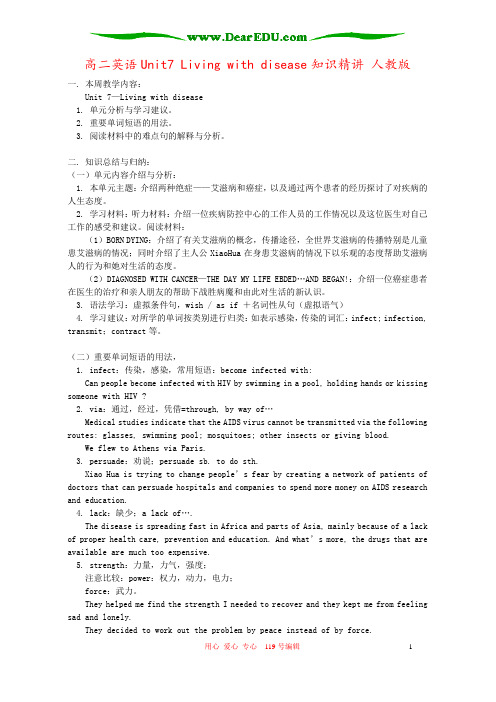
高二英语Unit7 Living with disease知识精讲人教版一. 本周教学内容:Unit 7—Living with disease1. 单元分析与学习建议。
2. 重要单词短语的用法。
3. 阅读材料中的难点句的解释与分析。
二. 知识总结与归纳:(一)单元内容介绍与分析:1. 本单元主题:介绍两种绝症——艾滋病和癌症,以及通过两个患者的经历探讨了对疾病的人生态度。
2. 学习材料:听力材料:介绍一位疾病防控中心的工作人员的工作情况以及这位医生对自己工作的感受和建议。
阅读材料:(1)BORN DYING:介绍了有关艾滋病的概念,传播途径,全世界艾滋病的传播特别是儿童患艾滋病的情况;同时介绍了主人公XiaoHua在身患艾滋病的情况下以乐观的态度帮助艾滋病人的行为和她对生活的态度。
(2)DIAGNOSED WITH CANCER—THE DAY MY LIFE EBDED…AND BEGAN!:介绍一位癌症患者在医生的治疗和亲人朋友的帮助下战胜病魔和由此对生活的新认识。
3. 语法学习:虚拟条件句,wish / as if +名词性从句(虚拟语气)4. 学习建议:对所学的单词按类别进行归类:如表示感染,传染的词汇:infect; infection, transmit;contract等。
(二)重要单词短语的用法,1. infect:传染,感染,常用短语:become infected with:Can people become infected with HIV by swimming in a pool, holding hands or kissing someone with HIV ?2. via:通过,经过,凭借=through, by way of…Medical studies indicate that the AIDS virus cannot be transmitted via the following routes: glasses, swimming pool; mosquitoes; other insects or giving blood.We flew to Athens via Paris.3. persuade:劝说;persuade sb. to do sth.Xiao Hua is trying to change people’s fear by creating a network of patients of doctors that can persuade hospitals and companies to spend more money on AIDS research and education.4. lack:缺少;a lack of….The disease is spreading fast in Africa and parts of Asia, mainly because of a lack of proper health care, prevention and education. And what’s more, the drugs that are available are much too expensive.5. strength:力量,力气,强度;注意比较:power:权力,动力,电力;force:武力。
